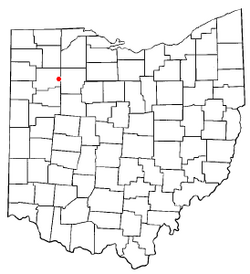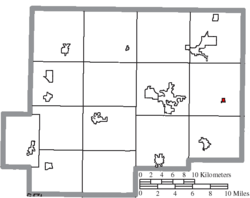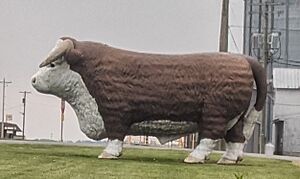Gilboa, Ohio facts for kids
Quick facts for kids
Gilboa, Ohio
|
|
|---|---|
|
Village
|
|

Location of Gilboa, Ohio
|
|

Location of Gilboa in Putnam County
|
|
| Country | United States |
| State | Ohio |
| County | Putnam |
| Government | |
| • Type | Village Council |
| Area | |
| • Total | 0.13 sq mi (0.34 km2) |
| • Land | 0.13 sq mi (0.34 km2) |
| • Water | 0.00 sq mi (0.00 km2) |
| Elevation | 745 ft (227 m) |
| Population
(2020)
|
|
| • Total | 168 |
| • Estimate
(2023)
|
166 |
| • Density | 1,282.44/sq mi (494.36/km2) |
| Time zone | UTC-5 (Eastern (EST)) |
| • Summer (DST) | UTC-4 (EDT) |
| ZIP code |
45875
|
| Area code(s) | 419 |
| FIPS code | 39-30114 |
| GNIS feature ID | 2398962 |
Gilboa is a small village located in Putnam County, Ohio, in the United States. It's part of Blanchard Township. The village got its name from Mount Gilboa, a place mentioned in the Bible.
In 2020, about 168 people lived in Gilboa. One of the most famous things about the town is a huge, 16-foot-tall statue of a bull made of fiberglass.
Contents
History of Gilboa
Gilboa was first planned out in 1837. It officially became a village in 1848. A post office opened in Gilboa in 1843, helping people send and receive mail. This post office stayed open for many years, finally closing in 1985.
A Difficult Time in 1852
In August 1852, Gilboa faced a very serious health challenge. A widespread illness, called a cholera epidemic, affected the village. The problem started because of unhealthy conditions in a large, damp cellar. This cellar had been used to store trash and waste.
The illness lasted for about two weeks, from August 6 to August 21. Sadly, 13 people in Gilboa passed away, including one of the two doctors who stayed to help. Many people, about 560 out of an estimated 600 residents, left the village to avoid getting sick. Four of Gilboa's six doctors also left during this time.
Famous Residents and Art
Oscar Velasquez (1944-2021) was a well-known artist and muralist who lived in Gilboa for a long time. He was famous for painting large pictures, called murals, on walls. Oscar Velasquez created more than 50 murals in different places across the country and even in other countries.
Gilboa's Location and Size
Gilboa is located at coordinates 41°1′2″N 83°55′16″W / 41.01722°N 83.92111°W. This helps pinpoint its exact spot on a map.
The United States Census Bureau says that Gilboa is quite small. It has a total area of about 0.15 square miles (0.34 square kilometers). All of this area is land, meaning there are no large lakes or rivers within the village limits.
People of Gilboa
| Historical population | |||
|---|---|---|---|
| Census | Pop. | %± | |
| 1850 | 378 | — | |
| 1860 | 315 | −16.7% | |
| 1870 | 315 | 0.0% | |
| 1880 | 287 | −8.9% | |
| 1890 | 264 | −8.0% | |
| 1900 | 346 | 31.1% | |
| 1910 | 345 | −0.3% | |
| 1920 | 235 | −31.9% | |
| 1930 | 201 | −14.5% | |
| 1940 | 209 | 4.0% | |
| 1950 | 181 | −13.4% | |
| 1960 | 207 | 14.4% | |
| 1970 | 212 | 2.4% | |
| 1980 | 212 | 0.0% | |
| 1990 | 208 | −1.9% | |
| 2000 | 170 | −18.3% | |
| 2010 | 184 | 8.2% | |
| 2020 | 168 | −8.7% | |
| 2023 (est.) | 166 | −9.8% | |
| U.S. Decennial Census | |||
The population of Gilboa has changed over the years. In 1850, there were 378 people. By 2020, the population was 168.
Life in Gilboa (2010 Census)
According to the census from 2010, there were 184 people living in Gilboa. These people lived in 71 different homes, and 50 of these were families.
Most of the people in Gilboa were White (94.6%). A small number were Asian (0.5%), from other races (3.8%), or from two or more races (1.1%). About 9.2% of the population identified as Hispanic or Latino.
In terms of age, the average age in the village was 34 years old. About 25.5% of the residents were under 18 years old. About 19% were 65 years old or older. The population was almost evenly split between males (49.5%) and females (50.5%).
Culture and Landmarks
The Gilboa Bull Statue
In the 1970s, a large 16-foot fiberglass bull statue was placed in Gilboa. It stands near State Route 224 and Pearl Street. Peter Diller, a resident of Gilboa, was the one who brought the bull to town.
At that time, Gilboa wanted to attract more visitors to its shops and restaurants. Peter Diller's father saw the bull outside a bar in Toledo, Ohio. He asked if he could buy it, and the bar agreed. Moving the huge bull back to Gilboa was quite a challenge because of its size. Peter Diller remembered, "Its head was so high that we had to jockey around every stoplight." He added, "The first stoplight… we hit it right on its forehead."
Once the bull was in place, it became a symbol of Gilboa's strength. Peter Diller explained, "We wanted something that represented the strength of the community, and what does that more than a big, strong bull?" Today, the bull statue is a famous landmark for anyone driving through Gilboa on State Route 224.
The Gilboa Quarry for Divers
The Gilboa Quarry was originally a limestone quarry, which is a place where rocks are dug out of the ground. It opened in the 1890s and was known as the Ottawa Stone Company. It stopped operating as a quarry in the early 1980s.
In 1990, the quarry was filled with water and reopened for a new purpose: SCUBA divers! The water in the quarry is very deep, ranging from 15 to 130 feet. This makes it a great spot for divers of all skill levels to explore underwater.
Education in Gilboa
Most students from Gilboa attend school in the Pandora-Gilboa school district. However, some students might go to the Ottawa-Glandorf school district instead.
Notable People from Gilboa
- Edward S. Matthias: He was a very important judge who served the longest time on the Ohio Supreme Court.
- Baldemar Velasquez: He is known for being an activist who works to improve conditions for workers in labor unions.
- Oscar Velasquez: As mentioned earlier, he was a talented artist and muralist.
See also
 In Spanish: Gilboa (Ohio) para niños
In Spanish: Gilboa (Ohio) para niños
 | Tommie Smith |
 | Simone Manuel |
 | Shani Davis |
 | Simone Biles |
 | Alice Coachman |


